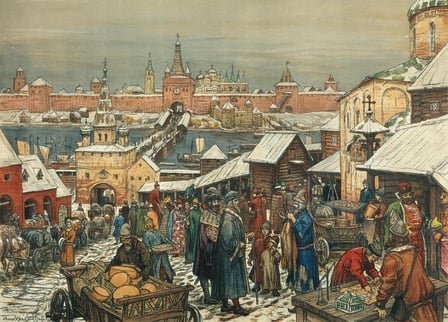Novgorod Part 1, one city to rule them all
The Rus have a long and rather rich history, with many cities bearing significant importance in the past. One of such places is Veliky Novgorod, or more commonly called Novgorod, and it’s one of the oldest cities still standing in Russia.
The city was mentioned in Rus’s history in the Sofia First Chronicle in 859. However, its first authentic appearance was Novgorod First Chronicle (shocking!) around the same time. It was already described as a central trade hub between the Varangians of Scandinavia and the Greek city-states. This means that the city must have been even older than that because it certainly didn’t rise to this extended power in one day.
A few years later, Novgorod became the Kievan Rus’ capital for a time – thanks to its significant political, economic, and cultural impact. However, as the confederation was formally settled when Oleg of Novgorod conquered Kiev in 882, Novgorod lost its title of capital to the latter. Out of the fact that Kiev was the only city that was more important than Novgorod, the confederacy was also called the Kievan Rus, not the Novgorod Rus.
The city saw many great princes rise in power, but none were as revered as Yaroslav the Wise, who also happened to be the last great Prince of Kiev. After the pacing of Yaroslav, the Kievan Rus as a whole started to lose power. Its principalities, one by one, decided that they were better on their own. Novgorod was no exception, and thanks to its still existing importance, the city was able to carve out the precursor of the Novgorod Republic.
Novgorod initially saw itself being dragged by the other Rus principalities into a war with the Mongol Golden Horde. And if you know your history, going to war with the Mongols is generally a bad idea unless you happen to have a protective ocean in the way (Japan laughs in typhoon). To make a long story short, the Rus got absolutely vaporized. Seriously, the war was so one-sided that we should probably create a new adjective for its intensity. Fortunately, Novgorod managed to survive those dark times without suffering significant damage. They did so by using the power of common sense. Seeing that their chance against the Mongol horde was equal to a kitten against a Siberian tiger, the boyars (noble Balkan men) preventively surrendered to them, becoming vassals of the Golden Horde.
This action probably got them the mockery of their neighbours; after all, the Rus were a warrior-based culture! They weren’t laughing as much when the Terminator grade Mongol war machine banged at their doors while ignoring Novgorod entirely.
As this post is turning way longer than anticipated, let’s continue with the history of this historic Rus city in the next episode.
